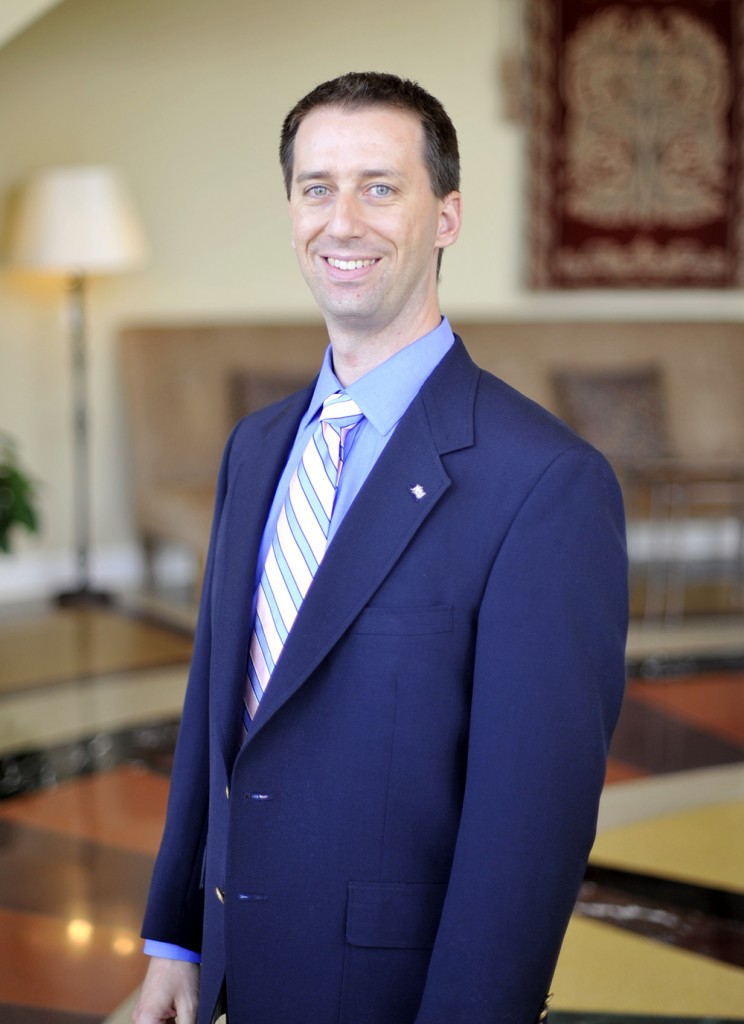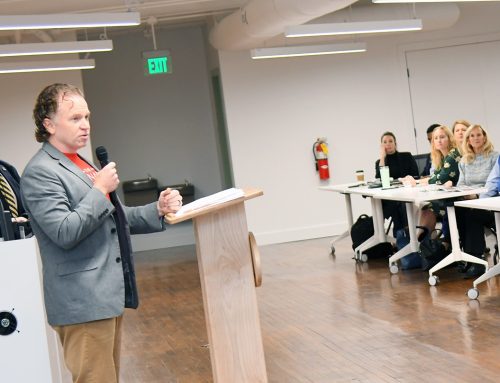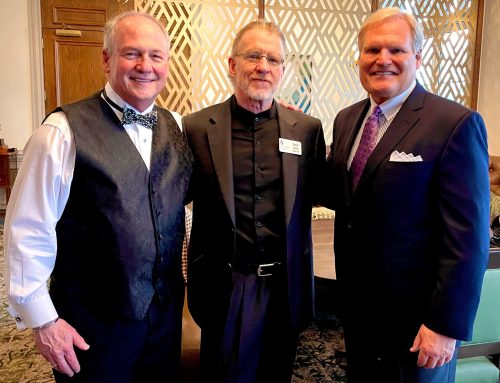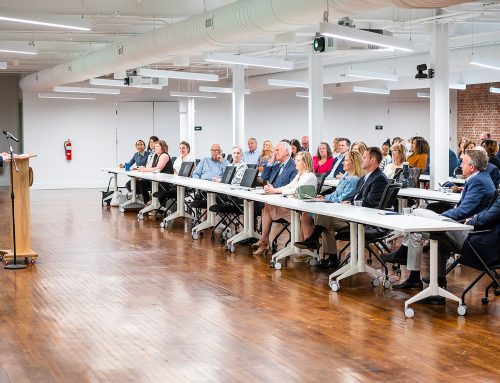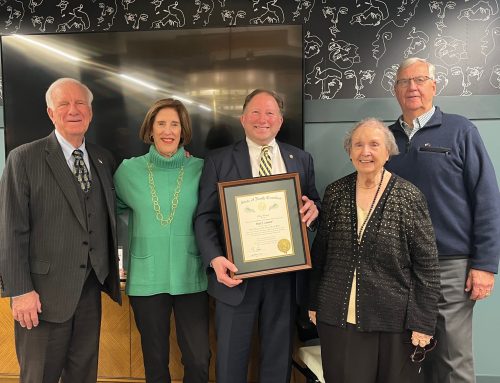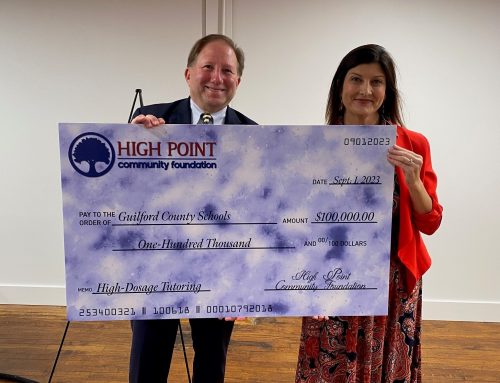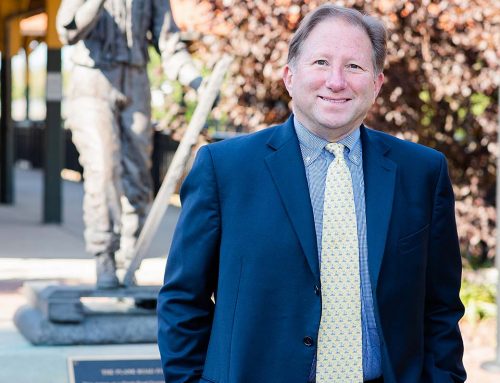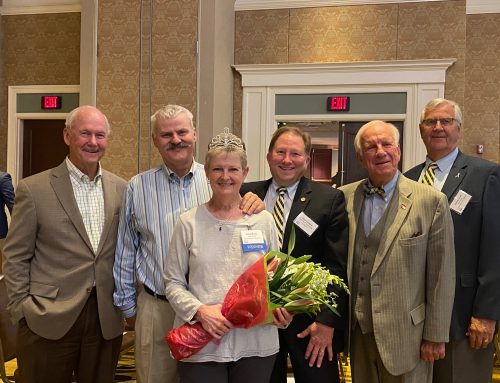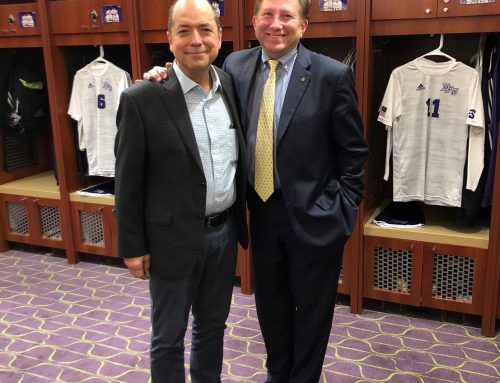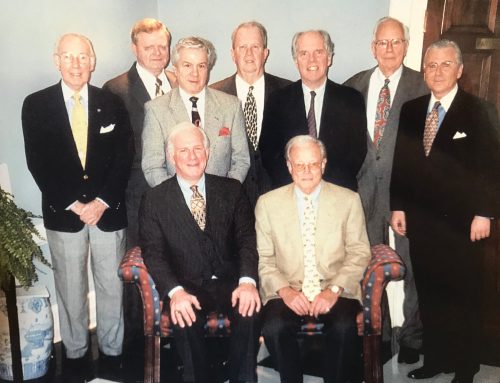Be like Joe.
At least that’s what HPU students seem to think.
They see him around campus, the tall, lanky professor with his satchel slung across his shoulder. They take his classes, seek his guidance and accept an outreach job when he offers. And they listen.
When they do, he introduces them to the city of High Point and how the concepts they learn in class can help improve the community beyond campus and where they will eventually live.
And students along with faculty and staff do just that.
They contribute more than 100,000 volunteer hours every year in a city where many families struggle to make ends meet. In doing so, they begin to embrace what Joe calls the “love of Jesus.”
Joe is the Rev. Dr. Joe Blosser, the Robert G. Culp Jr. Director of Service Learning.
Four years ago, he came to HPU to teach theology, philosophy, and ethics and take the school’s service learning program campus wide.
Today, he works with 35 professors who create service-learning programs in High Point and help students see volunteerism as a crucial part of life.
Meanwhile, the married father of two from Missouri has made High Point his home. And like HPU students, he volunteers, too.
He helps struggling neighborhoods find sustainable food options and serves on various boards – the High Point Community Foundation, the Greater High Point Food Alliance, and the High Point Jail Ministry.
He also serves as a deacon at his local church, Emerywood Baptist. On occasion, he preaches.
In a voice that rises and falls with emotion, he’ll stretch his arms wide, clench his fists for emphasis, sway when he prays and tell his fellow parishioners, “God is in you.”
But really, he is a professor, and his classroom is where he mines his other love: exposing students to the knowledge they need to become more compassionate, more understanding, more knowledgeable of who they are and where they live.
It works.
‘Challenge Yourself’
With the High Point Enterprise tucked under his arm, Blosser walks into Room 241 in Cottrell Hall and paces back and forth in front of his class, shaking in front of him the newspaper’s front page with the banner headline, “How do we get them here?”
“How do we get them here?” he says repeatedly to his dozen students. “Well, here’s how we get them here!”
His students have spent the semester interviewing 30 young professionals asking them about their own ethical quagmires because Blosser wants his students to understand what they’ll soon face in the working world.
Plus, he wants them to get connected to the city of High Point, and possibly stay here after graduation.
It’s part of a project his students will present to the High Point Chamber of Commerce. They’ll give city business leaders a 20-page report that details their ethical findings as well as ways to keep the under-30 crowd anchored in High Point.
His students will do that on a Wednesday. It’s a Tuesday. His students need practice.
They stammer, fidget and read from their laptop and notebooks as Blosser gives them tips: Plant your feet, move with intention, be comfortable where you are.
Before they leave, Blosser reminds them to hand in their reflection papers about the course.
“Remember, this will connect your undergrad education to the business world and give you resources that can guide you,” he says. “Then, you can know where your blind spots are. You need to grow and challenge yourself.”
Blosser tells his students that often – challenge yourself, get uncomfortable so you can grow. That’s the pastoral side of him.
“College, I believe, is the place to think about the hard things and the ethical decisions involved with some cool new business idea or a difficult task,” he says. “Simply, it’s building the skills they need for the laboratory of life.”
He pauses and laughs.
“That is why I’m a professor,” he says.
And students listen.
The World Opens Up
Nick James, a criminal justice senior from Cary, North Carolina, wanted to work in law enforcement like his grandfather and great grandfather in Texas. This fall, he got an internship working with the High Point Police Department.
He got to see how cops work. He made contacts and spent 320 hours on the job with police officers working every segment of law enforcement.
James found out about the internship after taking Blosser’s business ethics class two summers ago. Blosser connected James with the High Point Police.
Haley Beddor, a sophomore from Hopkins, Minnesota, took Blosser’s business ethics class this fall. She knew nothing about the city of High Point. Through Blosser, she discovered a side of the city that surprised her.
She and her fellow classmates visited BuzziSpace, a furniture manufacturer in High Point. Then, she met others working to revitalize the city.
Now, Beddor considers High Point not as a city of her university, but a potential place to start a career after graduation because of the revitalization she sees.
Then there is Christen Cothran. She is a senior from Rural Hall, North Carolina, and president of Impact Club, a Christian service organization.
Last summer, before Cothran went on a church mission trip to Belize, a friend of hers gave her the book, “When Helping Hurts: How to Alleviate Poverty without Hurting the Poor … and Yourself.”
What she read sparked a memory from two years before – hearing Blosser talk about the importance of meaningful service.
So, last summer, Cothran emailed Blosser. With his help, Cothran and the Impact Club created what Cothran describes as a “meaningful change” in the city of High Point.
Impact Club received $2,100 from HPU’s Student Government Association. In turn, Impact Club members used the money to buy toys and set the toys on three tables three Saturdays ago inside High Point’s Carl Chavis YMCA.
For $5, families walked in, ate local barbecue and picked out $15 worth of toys for their children. Over three hours, 55 people came. One of those was a tall woman in her early 30s.
She was divorced with five children. She told Cothran she had been in the hospital for three months because of a lengthy illness. Afterward, she lost her job and her house. Then, she lost her husband. He left her.
“The Lord will never give you more than you can bear,” the woman’s mother told her.
The next day, the woman came to the Carl Chavis Y. She sat in the car, searching for change to cover the cost. She didn’t have it. HPU volunteers covered her ticket, and she came in and picked out toys for her children.
“This is my family’s Christmas,” she told Cothran in a hushed voice.
Cothran calls what unfolded that day the “Christmas miracle.” Blosser helped make that happen. The event’s name fits: Impact Christmas.
“Dr. Blosser showed me a better path that would bring longer lasting results,” she says. “And he told me it’s not important how I feel. It’s how the community feels.”
To Blosser, Cothran got it.
“I relish that,” he says. “I know in my own life how pivotal those experiences were for me. The world opened up. It’s like thinking that the world I once knew was blue, and now I see it as green and purple.
“I’ve always been grateful for the people who helped me get there, and when I see that happening with someone I’ve helped, it’s affirming that I’m doing the right thing.”
Living in Faith
Last month, Blosser went to the chamber’s regular meeting and watched his students give a presentation about how to keep young professionals in the city of High Point. As Blosser sat, with his hand on his chin, he listened to many.
Like Beddor.
“I came here for the university, but my attitude has changed about the city,” Beddor told them. “I see this place potentially as a city to live after college because of the revitalization I see happening. I want be a part of that change. We can make this place attractive to young professionals.”
After the meeting, Beddor stayed behind to talk to a few business leaders and ask them more questions. But Blosser was off. With his satchel slung over his shoulder, he was off to another meeting, another opportunity to live his faith.
It is what he does, what he preaches, what he teaches in class. It’s what he once spoke about on a Sunday morning not far from his house.
“The first step in living out Jesus’ radical love,” he said during a sermon at Emerywood Baptist, “is to find that ministry that makes your eyes burn with the Holy Spirit.”
Dr. Blosser has definitely found his.
[Joe Blosser is a board member and head of the grants committee at HPCF. This article was first printed in HPU’s Caring People, Extraordinary Education News.]


